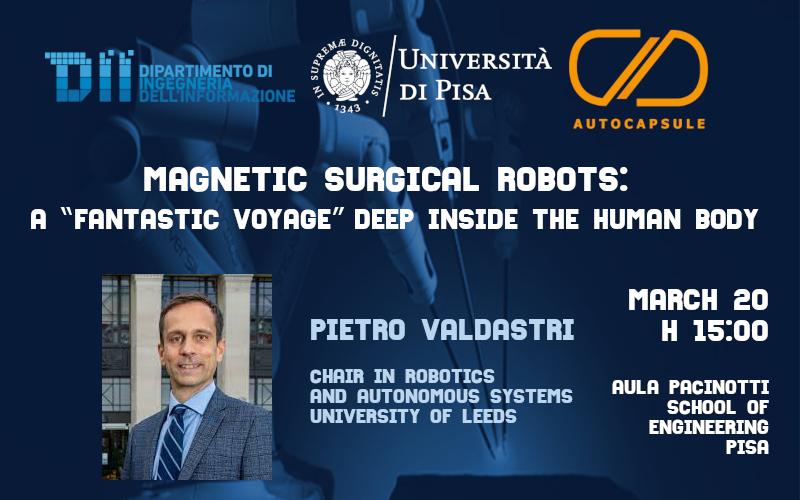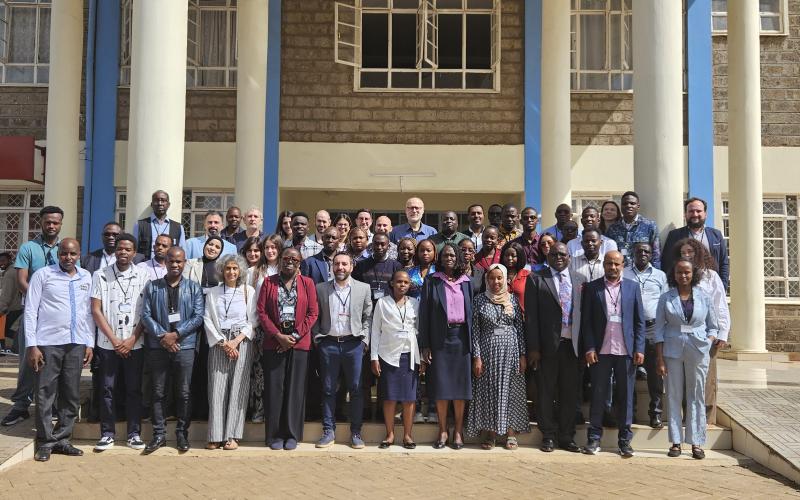In questi giorni il team di bioingegneri composto da Arti Ahluwalia, Carmelo De Maria e Chiara Belmonte si trova a Nairobi per tenere un corso intensivo nell'ambito del progetto Afra Moya, di cui il...
Leggi tuttoMagnetic Surgical Robots: A “Fantastic Voyage” deep inside the human body

Aula Pacinotti, School of Engineering Pisa
March 20 h 15:00
Abstract
Magnetic fields offer the possibility of manipulating objects from a distance and are ideal for medical applications, as they penetrate human tissue without inflicting any harm on the patient. Magnetic fields can be harnessed to actuate surgical robots, enhancing the capabilities of surgeons in reaching deep into the human anatomy through complex winding pathways, thus providing minimally invasive access to organs that are out of reach with current technologies. In this talk, we will explore various robotic architectures based on magnetic control, specifically designed for lifesaving clinical applications. These architectures include a magnetic flexible endoscope for painless colonoscopy, soft magnetic tentacles personalized for reaching peripheral areas of the lung and navigating the pancreatic duct, and magnetic “fusilli” robots designed for collaborative bimanual tasks in a confined workspace. We will also discuss enabling technologies, intelligent control, potential levels of computer assistance, the path to first-in-human trials, and highlight the future challenges associated
Bio
Pietro Valdastri is Full Professor and Chair in Robotics and Autonomous Systems at the University of Leeds.
He directs the Science and Technologies Of Robotics in Medicine (STORM) Lab , focusing on intelligent robots to fight cancer, the Institute of Robotics, Autonomous System and Sensing (IRASS), and the Robotics at Leeds network . He received his Laurea degree in Electronic Engineering from the University of Pisa in 2001 and his PhD in Biomedical Engineering from Scuola Superiore Sant’Anna in 2006. After the PhD, he became Assistant Professor in Biomedical Engineering at the BioRobotics Institute of Scuola Superiore Sant’Anna. In 2011, Prof Valdastri moved to Vanderbilt University as an Assistant Professor in Mechanical Engineering until 2016, when he relocated to Leeds.
He has published more than 150 peer reviewed journal papers in the field of medical robotics and has been principal investigator on grants in excess of $24M supported by NSF, NIH, ERC, EU-H2020, Cancer Research UK, The Royal Society, EPSRC, Innovate UK and industry, including the NSF CAREER Award with the proposal “Lifesaving Capsule Robots” in 2015, the ERC Consolidator Grant Award with the proposal “NoLiMiTs – Novel Lifesaving Magnetic Tentacles” in 2019, and the KUKA Innovation Award for his robotic colonoscopy platform in 2019. Prof. Valdastri is a Royal Society Wolfson Research Fellow, a Fellow of the Institute of Electrical and Electronics Engineers (IEEE), the Editor for Medical and Rehabilitation Robotics of the IEEE Robotics and Automation Letters, and a member of the steering committee of the International Society for Medical Innovation and Technology (iSMIT). STORM Lab’s research has been featured by several news outlets, including the BBC, The Times, The Washington Post, The Financial Times, New Scientist, The Spectator, WIRED, IEEE Spectrum, Medgadget, Daily Mail, The Engineer, Ingenia Magazine, Medical Design Technology Magazine, Medical Xpress, Newswise, NSF Science Now. Prof Valdastri also completed a successful entrepreneurial cycle with WinMedical s.r.l., a company he co-founded in 2009 and that was acquired by a larger enterprise in 2017. He recently started a new company, Atlas Endoscopy Limited, to bring his robotic colonoscopy platform to patients.



